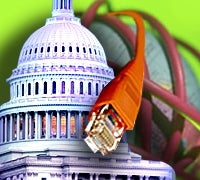 |
The Federal Communications Commission voted today to rebuke the nation’s largest cable provider for slowing certain Internet traffic on its network and failing to provide adequate notice to subscribers.
By a 3-2 vote, the FCC approved an enforcement order that will require Comcast (NASDAQ: CMCSA) to change the way it manages traffic, and submit a compliance plan to the commission by the end of the year detailing those changes. The ruling does not impose any fines.
“Comcast was delaying subscribers’ downloads and blocking their uploads,” FCC Chairman Kevin Martin said. “It was doing so 24/7, regardless of the amount of congestion on the network or how small the file might be.”
“Today, the commission tells Comcast to stop, and to disclose to its subscribers how it is going to manage traffic on a going-forward basis. We therefore take another important step to ensure that all consumers have unfettered access to the Internet.”
The outcome of today’s vote, though expected, may stand as a milestone in the debate over Net neutrality, the principle that all Internet traffic should be treated equally. Several attempts to write Net neutrality into law have failed in Congress, and until today, the FCC’s action on the issue had been limited to holding hearings and seeking public comment.
The FCC’s review of Comcast’s network management stems from a complaint filed by the nonprofit advocacy groups Free Press and Public Knowledge. That complaint came in response to the discovery that Comcast had been slowing traffic from the peer-to-peer site BitTorrent.
For Comcast, the decision clearly comes as a blow.
“We are disappointed in the Commission’s divided conclusion because we believe that our network management choices were reasonable, wholly consistent with industry practices and that we did not block access to Web sites or online applications, including peer-to-peer services,” Comcast spokeswoman Sena Fitzmaurice said in a statement.
Critics question FCC’s guidelines, authority
The commission’s two Democrats joined Martin, a Republican, in today’s finding that Comcast had violated the FCC’s three-year-old Internet principles, which declared that consumers should be entitled to access lawful Internet content and run online applications, services and devices of their choice. The commission’s other two Republicans on the commission voted against the order.
Because the FCC’s principles never went through its formal rulemaking process, however, Comcast, lawmakers and some Republicans within the commission have questioned whether they are enforceable.
Dissenting Commissioner Robert McDowell called the FCC’s action “legally deficient,” adding that “the commission did not intend for the Internet policy statement to serve as rules.”
In addition to questioning the legality of the commission’s decision, the two dissenting commissioners argued that Comcast was addressing the concerns about subscriber notification and network management on its own.
In February, Comcast altered its terms of service agreement to reflect its policy of managing traffic.
In March, Comcast announced that it was working with BitTorrent to develop a reasonable solution to deliver its peer-to-peer traffic. Comcast said at the time that it would move toward a “protocol-agnostic” approach to network management by the end of the year, meaning that peer-to-peer traffic would not be singled out for throttling.
[cob:Pull_Quote]Under the enforcement order, Comcast will have to provide evidence to the FCC that it is living up to its word.
The dissenting commissioners aren’t alone in questioning the FCC’s authority on the matter.
In a letter to Martin sent yesterday, House Minority Leader John Boehner (R-Ohio) suggested that the FCC might be overstepping its authority on the issue, and argued against government interference in the Internet.
The highly partisan nature of the Net neutrality debate has been the main reason that attempts at legislation that include the principle have failed. Currently, there are two Net neutrality bills in the House and one in the Senate.
The questionable legal standing of the FCC’s action invites the possibility that Comcast could challenge the ruling in court, suggested Blair Levin, an analyst with Stifel Nicolaus and former FCC chief of staff.
Writing in a research note, Levin said that the outcome of any litigation, while highly uncertain, would set the stage for how the new Congress and president treat the issue of Net neutrality.
[cob:Special_Report]In her statement, Comcast’s Fitzmaurice noted that the “commission’s order raises significant due process concerns and a variety of substantive legal questions. We are considering all our legal options and are disappointed that the commission rejected our attempts to settle this issue without further delays.”
Meanwhile, Net neutrality proponents have already begun the victory dance.
“The FCC’s bipartisan decision to punish Comcast is a major victory,” Free Press Executive Director Josh Silver said in a statement. “Today’s order makes it clear that there is nothing reasonable about restricting access to online content or technologies. Moving forward, this bellwether case will send a strong signal to cable and phone companies that such violations will not be tolerated.”
Another group, the Electronic Frontier Foundation (EFF), today announced the availability of a tool to help users detect when their Web activities are being similarly slowed by their Internet service provider.
Named “Switzerland” in a not-so-subtle play on the term “Net neutrality,” the application is available as a free download that purports to notify users when ISPs are blocking their traffic.
The EFF said that the tool is geared for technically sophisticated users, but that a more elementary version is being developed.


